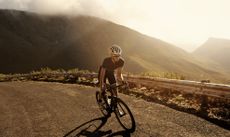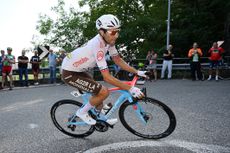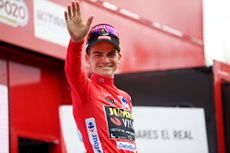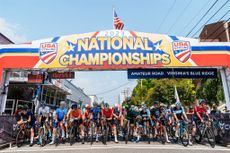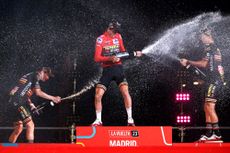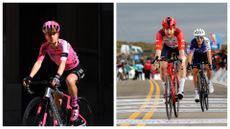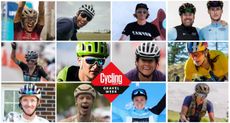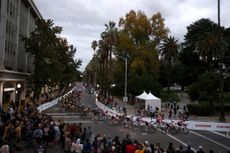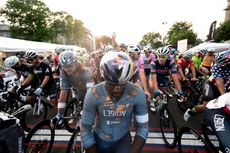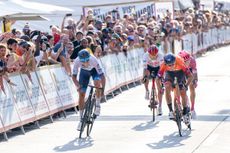19 years, 18 Olympic gold medals and 17 world titles: meet the visionary behind the longest running women's professional cycling team in the world
Nicola Cranmer reflects on almost two decades of Team TWENTY24’s success and her role in 'creating opportunity' for its many successful riders
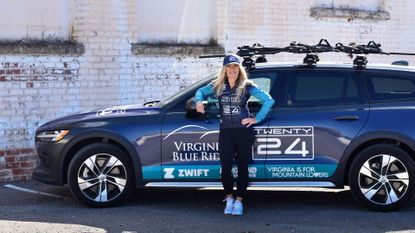
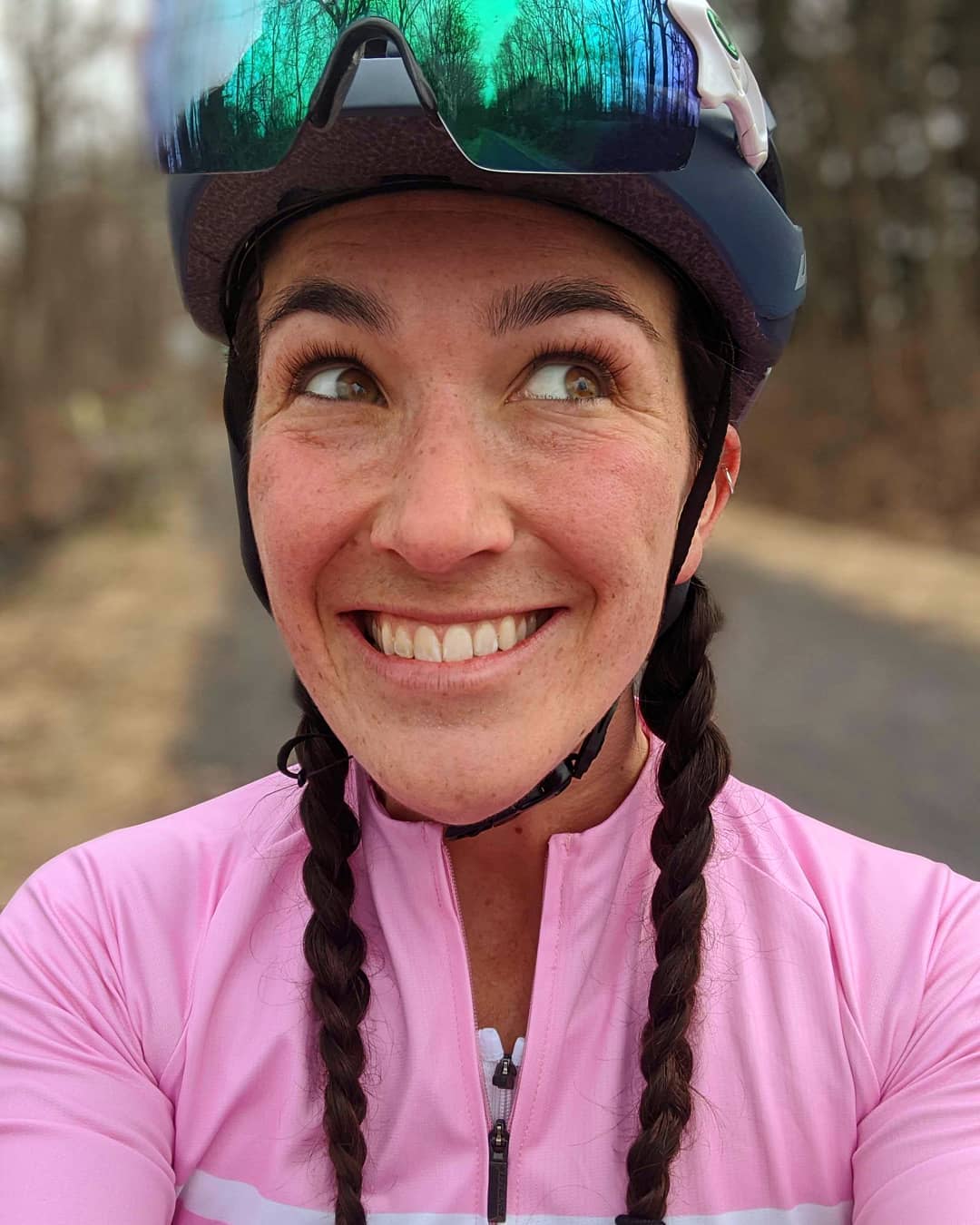
Nicola Cranmer believes in the supreme power of serendipity. She believes in success beyond bike racing, and that what most people need is, simply, an opportunity – even if that sometimes means creating that opportunity from scratch.
Cranmer is the general manager of United by Sport LLC, the management company behind the currently named Virginia's Blue Ridge Team Twenty24 women’s team.
Cranmer, herself a former professional mountain biker, started the team back in 2004 and is now officially the longest running women’s cycling team ever. Nineteen years later, it’s also one of the winningest teams ever, having developed and fostered the likes of Jennifer Valente, Chloe Dygert and Coryn Rivera. All in all, her riders have earned 18 Olympic and Paralympic gold medals and 17 world championship titles.
We spoke with Cranmer while she was home in the team’s new headquarters in Roanoke, Virginia, to learn what’s behind Twenty24’s longevity and success. Spoiler alert: we think it may just be Cranmer herself, even if she’s quick to dismiss that notion.
“My feeling is I’m not a special person; I work hard, I’m able to see opportunities, and there are just people who need only opportunity. You present it to them and they can thrive,” she says. “But a lot of girls and women just don’t even get an opportunity.”
A post shared by Nicola Cranmer (@nicolacranmer)
A photo posted by on
Nicola’s Roots
Growing up in the UK, Cranmer was “horse crazy,” as she puts it, and she was opportunity-driven even as a preteen; she and her cousin would wander around their grandmother’s village of Witsbury looking for unattended horses in fields and take the liberty of just getting on them to ride.
As a teenager, Cranmer worked with horses in a more formal setting, under David Elsworth, one of the most notable horse trainers in the country.
She attributes her philosophy towards working with high-performance athletes with working for Elsworth. “Unless you know horses it probably sounds like a crazy statement, but there's a lot of similarities,” she says. “You just build trust. So the things that I’m recommending [to my riders], they believe me.”
When Cranmer took the opportunity to move to the United States in 1986, she found herself in Marin County, and basically had no choice but to be swept up by the tidal wave that was the inception of mountain biking in the ‘80’s. Cranmer’s love for being outside on a bike led her quickly to racing mountain bikes at the pro level, and from there she eventually branched out to a co-ed criterium team.
2004

Coryn Labecki (née Rivera) was part of Cranmer's team between 2009 and 2012
Cranmer started her program, then named ProMan Hit Squad, in 2004, the year Marianne Vos started her dominant reign, Lance won his sixth Tour de France, and women’s cycling was getting only tiny fraction of the support as men.
When the women on her co-ed criterium team started outperforming the men, the women expected the team's financial support and equipment to become more equal to reflect that, but no dice. Frustrated with the inequality, Cranmer decided to start her own women’s team.
“It just pissed me off. So I said ‘I’m going to start my own team.’ And I didn’t even know what that meant, to be honest,” Cranmer recalls. “But the words flew out of my mouth and then I had to follow through.
“When I started the team, I definitely was not looking at this as a career,” she says. However, Cranmer realized that to allow the team to keep growing, she would have to give up her other jobs to put all her energy into the team. “Which isn’t the best financial decision I’ve ever made, but I've been very lucky.”
And, it turns out, she’s been smart. She did something that no other team in North America was letting riders do at the time: She let them race for the national squad. Rather than prioritize the notoriety of the team and its sponsors, she allowed her athletes to don Team USA jerseys in order to enter races she couldn’t afford to send them to.
We’ve become really good at winning. But when you just take it a little bit further and understand the power of the bicycle in a different way, and you can help women in life, that’s really meaningful to me.
Nicola Cranmer
And it was effective.
In 2010, when the team was called Peanut Butter and Co / TWENTY12, Team USA sent Mara Abbott and an incredible group of women to race the Giro Rosa, the longest and toughest women’s grand tour at the time. Aside from one athlete, that entire team was made up of Cranmer’s riders and they made history when Abbott became the first American to win the iconic pink jersey.
As she’s telling these stories, Cranmer mentions everyone who helped her by name –Emily Zell, Kristin Armstrong, Giana Roberge, Shelley Olds, Julia Violich– each of the names she articulates and remembers fondly.
Olds was one of the women who she brought with her from the co-ed crit team over to her new women’s team. They also formed a UCI trade team around Old’s incredible track talent, and hosted racing at the Hellyer Velodrome to help fund their team travel.
“We would make money on the entry fees and fans, and [riders’] parents would bake things. We literally had a bake sale to fund our World Cup races,” Cranmer says with a laugh.
The team grew faster than she anticipated. In fact, she never really anticipated it would grow at all. The lack of a master plan mapped out from the start might just be what allowed the team to morph into something so unique and successful.
“Sometimes when you trust in a process and you're open to opportunity, good things happen,” Cranmer says. “I think that I've always been open to the flow of things.”
A one-of-a-kind team

Chloe Dygert was part of Cranmer's program from 2016-2020
This flexibility is what allows so many athletes to thrive on her team. Often, Cranmer chooses to put the team goals aside for the greater good of the bigger picture, which often means the needs of the national team.
“So very few teams have done that, and I think that’s why we’ve been very successful at becoming a home for an athlete like Jennifer Valente for over a decade.” The athlete’s personal goals are the team’s goals. “It’s different,” she says. “Some of it might be a bit crazy, but it works.”
Valente, who’s been a part of Cranmer’s team since 2012, has absolutely thrived in the program, winning three Olympic medals and seven world champion titles since then. Valente is primarily a track cyclist, though she does race criteriums with the team. Along with her Olympic track pursuits, she’s getting an education along the way.
Some of it might be a bit crazy, but it works.
Nicola Cranmer
One of Cranmer’s greatest strengths is “looking at the bigger picture of who people are and what they need in order to perform their best,” Valente tells Cycling Weekly. “I don’t think some [team managers] would recognize how important some of my things outside of cycling are to me, and that allowing me balance actually makes me perform better.”
And sometimes those things are just a good dose of #happinesswatts: After Valente and her teammate Jasmin Deuhring medaled at the Rio Olympic games, the two track racers –who had been focusing intently on team pursuit and omnium training–asked Cranmer if they could race Leadville, the 100-mile mountain bike race through the mountains of Colorado. And although it had nothing to do with their specialty or goals, Cranmer was thrilled to let them do something they were excited about.
“They both did Leadville and we had a blast,” she says.
Often, the balance the riders need comes from not racing too. “Sometimes [Chloe Dygert] would race 13 race days in a year,” says Cranmer. “It was almost like we were paying her not to race, so she could be successful for herself.”
Finding balance between cycling and life

Kristin Armstrong addresses the media with Cranmer alongside her
“For someone who’s been running a program of this caliber for 19 years, and even though this job is all-consuming and pretty much is 24/7 for her, she’s not all about cycling,” Junior Team Manager Kaitie Keough says. “I think that’s the main reason she’s been so successful.”
And when we spoke with Cranmer, we did get that sense: Our conversation drifted from bikes to travel to horses to the flower shop she used to own. Her perspective truly contains the bigger picture, which is somewhat rare in the single minded sport of bike racing. For Cranmer and all the members of TWENTY24, the big picture often spans much wider than bike racing.
“We’ve become really good at winning,” she says. “But when you just take it a little bit further and understand the power of the bicycle in a different way, and you can help women in life, that’s really meaningful to me.”
Cranmer has helped Cuban rider Marlies Mejias step by step through the long process of achieving her non-cycling goal: getting residency in the United States. “To me, that’s much bigger than cycling, it’s giving someone an opportunity for her to thrive as an athlete but also an opportunity for her daughter.”
Cranmer has also extended a hand up to Rukhsar Habibzai, one of Twenty24’s development athletes from Afghanistan. She and Kristin Armstrong had been in touch with her women's development cycling team in Kabul, who were accustomed to getting abusive things yelled at them and rocks thrown at them by men when they rode down the street.
“We wanted to help these girls,” she says was in the airport the day the Isis bomb went off in Kabul, trying to leave the country as the Taliban invaded. Thankfully, she got out. She and Cranmer stayed connected, and Rukhsar is living in Virginia now, getting ready to go to college next year.
Connecting riders with their next step in life is another big part of what she does, like connecting her junior riders with college scholarships. One such rider was Kaitie Keough, who joined the team as a junior and earned a scholarship to Marian University. She now works for the team managing the junior program, the main goal of which is to connect girls with college scholarships.
“[Cranmer] has always been a big advocate for getting your education,” says Keough. “She had high expectations of us on the bike, but it was clear that this wasn’t the be-all-end-all and she encouraged us to go pursue other things.”
The future of Team Twenty24

Jennifer Valente been a part of Cranmer’s team since 2012
“I tend to think in four-year increments,” Cranmer says. For the next year, they’re focused on the Paris Olympics. Valente has already qualified, and Cranmer is hoping to get a couple more athletes on the team as well.
And then?
“Hitting reset and moving forward to 2028,” she says. “We have a really good roster for next year–I’m excited about it.”
Cranmer is also developing a podcast called United by Sport, which she is very stoked on. It's not necessarily a cycling podcast; she’s hoping to speak with athletes, coached, and individuals who share one common thread: their profound love for sport.
“It might be stories like Rukhsar's story from Afghanistan,” says Cranmer. “We came together through sport, but her story is much bigger than cycling.”
She’ll be running it with Sam Worthington, an old cycling acquaintance from the Bay Area. “He is very different from me, which I love,” she said. “We’re both geminis but he’s like the opposite of that. I‘m more passion-and-emotion, but he’s very business-driven. I think we complement each other really well.”
If everything is in place financially in 2028, Cranmer hopes to step away after the L.A. games, and let other team leaders like Keough take over the day-to-day operations.
She definitely has plans to stay put for a while, however.
“There’s been periods of time in my almost two-decade span of running the team, where I've felt like the team is running me,” she reflects. But she feels lucky to have identified a passion and a purpose in this life. “I feel very motivated by helping girls and women reach their goals.”
“Her ‘why’ is very different from most people in her position,” says Keough. “When you sit down and talk with her, you get that sense. I haven't met very many people like her.”

Thank you for reading 20 articles this month* Join now for unlimited access
Enjoy your first month for just £1 / $1 / €1
*Read 5 free articles per month without a subscription

Join now for unlimited access
Try first month for just £1 / $1 / €1
Get The Leadout Newsletter
The latest race content, interviews, features, reviews and expert buying guides, direct to your inbox!

Riley Missel is an American freelance writer, editor, and digital storyteller based in the Southwest. Her byline has appeared in Lonely Planet, Outside, Self, VeloNews, Cycling Weekly, Bicycling, Runner’s World, Road Bike Review, Mountain Bike Review, and Dirt Rag.
-
 2024 should be the year of achievable cycling goals
2024 should be the year of achievable cycling goalsDon’t overstretch yourself or push too hard, but aim for targets you can hit
By Adam Becket Published
-
 Larry Warbasse claims what could be the world's toughest Strava KOM
Larry Warbasse claims what could be the world's toughest Strava KOMThe 89.5km Mauna Kea climb in Hawaii rises from sea-level to 4,214 metres with steep gravel sections on the way
By James Shrubsall Published
-
 Will Sepp Kuss spark a US road cycling revival?
Will Sepp Kuss spark a US road cycling revival?It’s been some 15 years since we saw such an exciting contingent of American riders in the WorldTour; there’s hope their ember can spark a fire in the hearts of American sports fans
By Anne-Marije Rook Published
-
 From esports to cyclocross, here’s the 2024 USA Cycling National Championship schedule
From esports to cyclocross, here’s the 2024 USA Cycling National Championship schedule2024 will see 18 National Championships across road, mountain track, cyclocross, gravel, BMX and esports cycling disciplines
By Anne-Marije Rook Published
-
 American stars shine abroad while domestic races dwindle — What does the future hold for US cycling?
American stars shine abroad while domestic races dwindle — What does the future hold for US cycling?It was an incredible year for American riders on the WorldTour yet road racing in North America is on the decline.
By Tyler Boucher Published
-
 American riders and domestic road races to follow in 2023
American riders and domestic road races to follow in 2023Here's a road season preview for American bike racing fans
By Clara Beard Published
-
 Gravel riders of note: as gravel racing defines itself, these folks are leading the charge
Gravel riders of note: as gravel racing defines itself, these folks are leading the chargeAs gravel racing moves to define itself amid worldwide popularity, these early adopters are now carving out a unique professional cycling career. Meet gravel racing's biggest stars.
By Marshall Opel Published
-
 The National Cycling League announces a $1 Million dollar prize purse
The National Cycling League announces a $1 Million dollar prize purseMaking its debut season in 2023, the National Cycling League will be held across four major cities in the U.S.
By Anne-Marije Rook Published
-
 Pushing beyond the norm: new Red Bull film chronicles Justin Williams' journey in cycling
Pushing beyond the norm: new Red Bull film chronicles Justin Williams' journey in cyclingAfter feeling like an outsider in Europe, Justin Williams formed the first all-Black cycling team.
By Anne-Marije Rook Published
-
 Sep Vanmarcke wins thrilling sprint in the inaugural Maryland Cycling Classic
Sep Vanmarcke wins thrilling sprint in the inaugural Maryland Cycling ClassicSep Vanmarcke wins thrilling sprint in the inaugural Maryland Cycling Classic in Baltimore.
By Anne-Marije Rook Published
